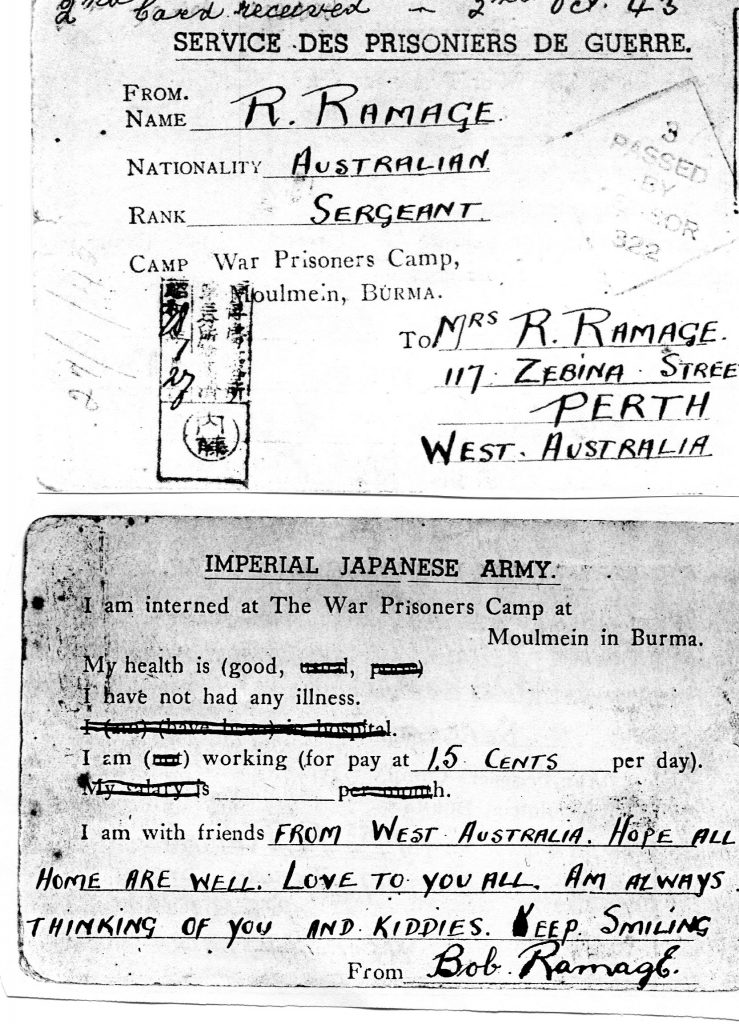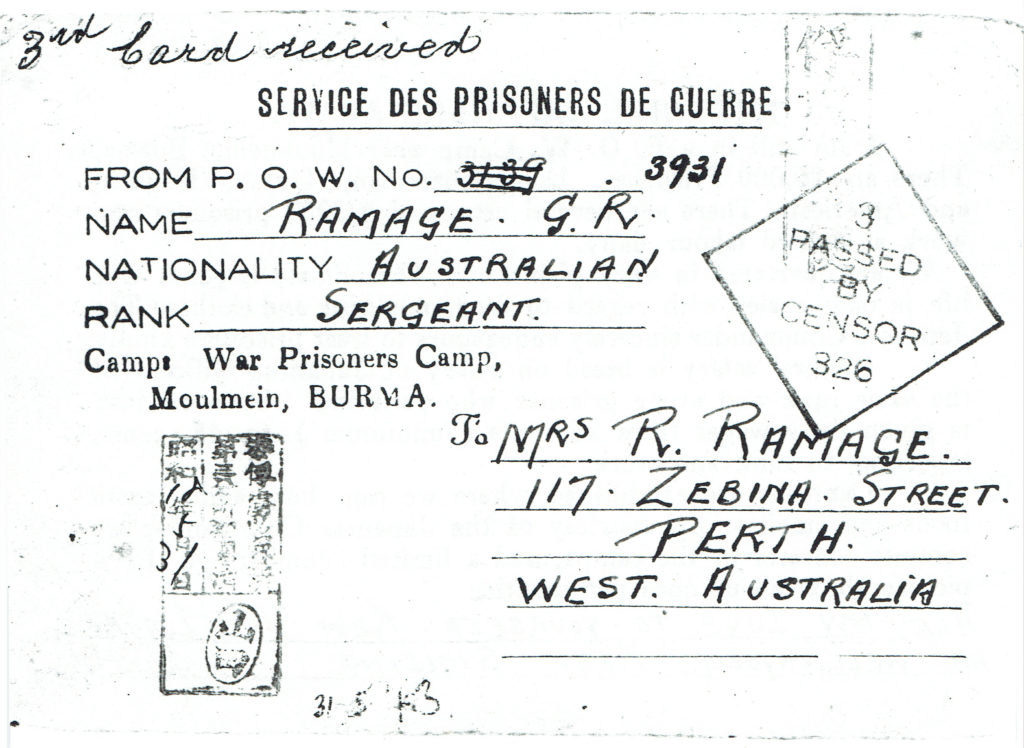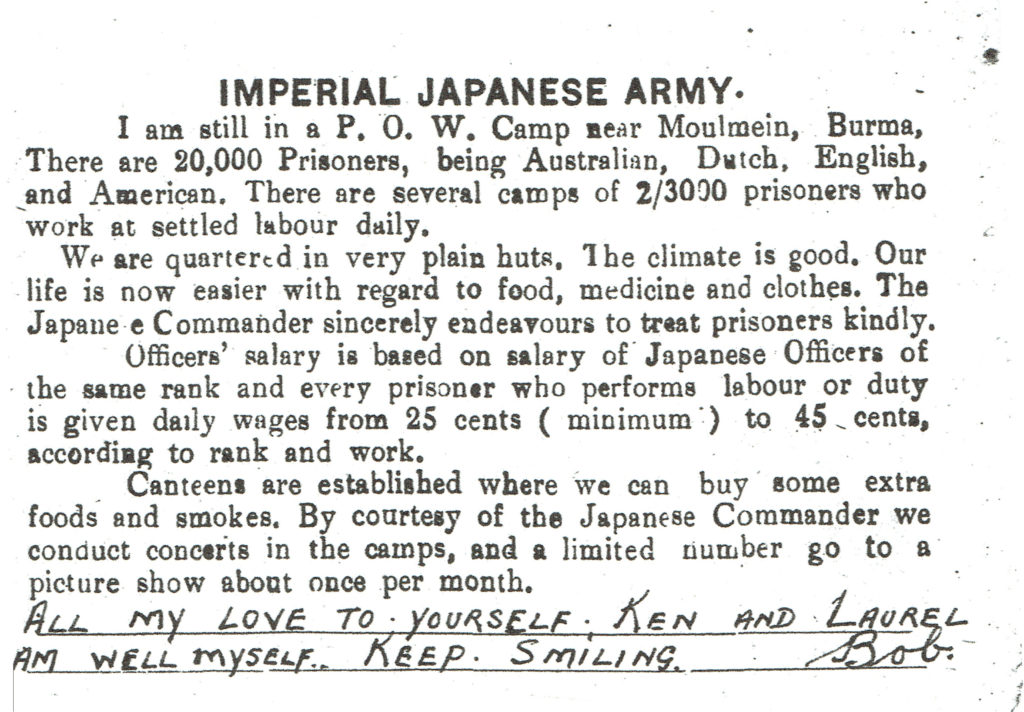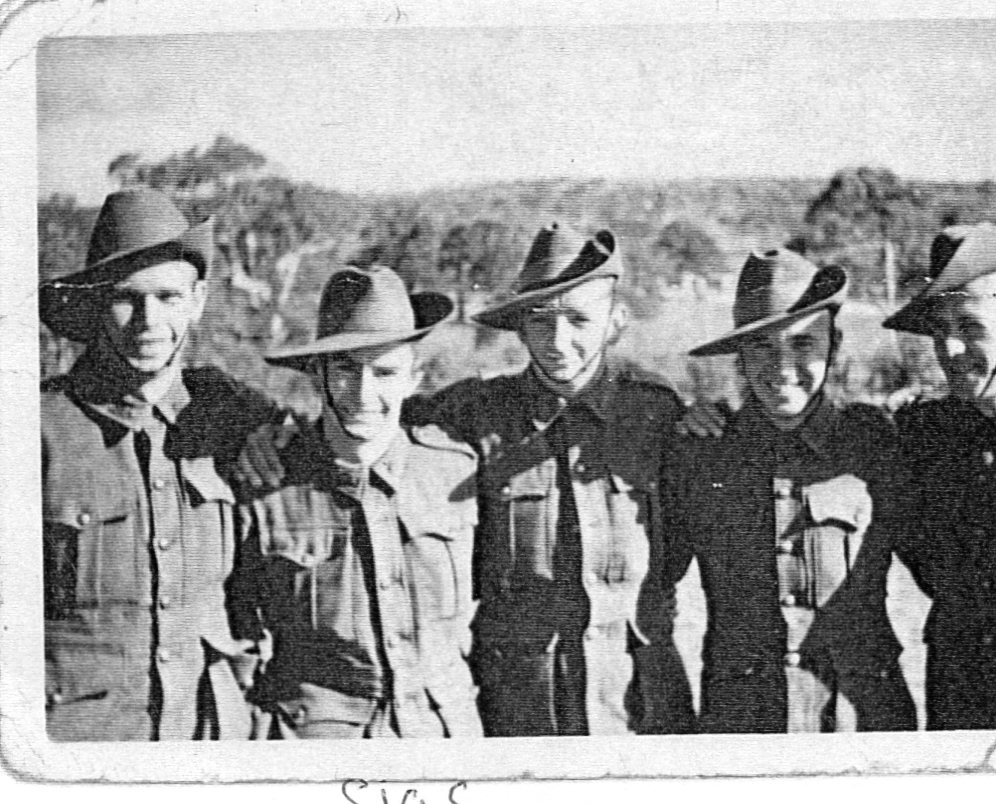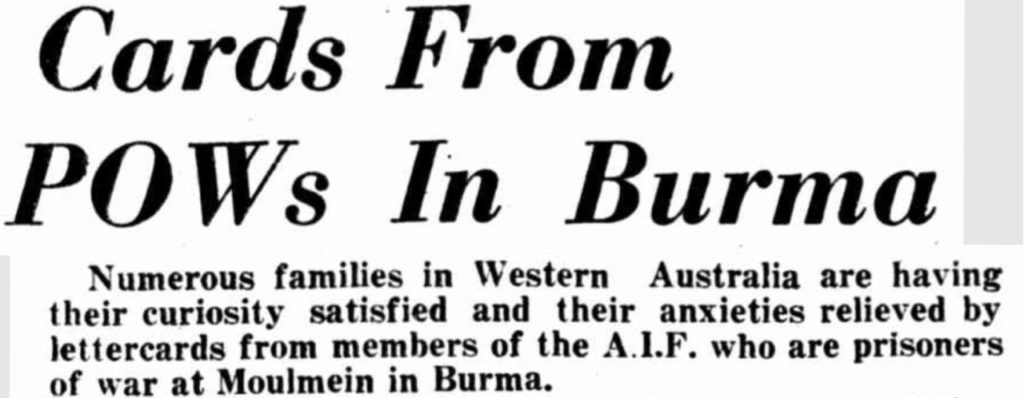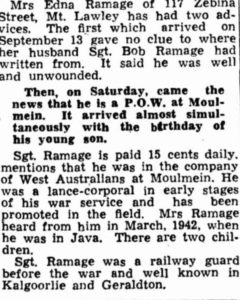The Soldier's Details

- Surname:
- Ramage
- First Name:
- George Robert
- Nick Name:
- Bob
- Rank:
- Sergeant
- Regimental #:
- WX9059
- Classification:
- Signaller
- Company:
- Headquarters Company, No. 1 Platoon - Signals
- Enlisted:
- 25.10.1940
- DOB:
- 24.06.1905
- Place of Birth:
- Cape Leeuwin, Western Australia
- Father's Name:
- George Ramage
- Mothers's Name:
- Ellen Ramage
- Religion:
- Church of England
- Pre-war Occupation:
- Guard, W.A.G.R
- Memorial:
- Thanbyuzayat War Cemetery, Plot A3, Row B, Grave 15, Age 38.
- Java:
- ‘Blackforce’
- Force:
- ‘ A’ Force Burm, Java Party No. 4, Williams Force
- Camps Burma:
- Tanyin, Anakwin,Taungzun 75, Mezali 72, Apalon, Kwondaw 95, Payathonzu
- Camps Java:
- Bicycle Camp Batavia
- POW#:
- 3931
- Cause of Death:
- Dysentery
- Place of Death:
- Payathonzu 108km Camp, Burma
- Date of Death:
- 23.09.1943
- Buried:
- Grave No. 17, Payathonzu
General Description
Bob Ramage enlisted AIF Oct 1940, later joined 2/4th’s Headquarters Company No. 1 Platoon Signals under Commanding Officer Lt Curnow. Bob trained as a rangetaker.
He was one of about 90 men from 2/4th who had ‘jumped ship’ at Fremantle on 15 January 1942 and unable to re-board before ‘Aquitania’ departed for Singapore the next day. He therefore did not reach Singapore as planned and remained in Java and with the Allied Forces there. Consequently he was never in Singapore, only when passing through from Java to Rangoon, Burma.
At least four men from HQ No. 1 Platoon, did not manage to reboard ‘Aquitania’. At least eight men from HQ No. 1 Platoon were KIA Hill 200 Ulu Pandan 11 February, 1942 including their Commanding Officer Lt. Frank Curnow and Platoon Sergeant Hansen. Please read about Hill 200 Ulu Pandan.
Please read further about the 90 men from 2/4th who were AWOL Fremantle.
He became POW of Japan when the Dutch East Indies surrendered to the Japanese Imperial Army really, without firing a shot. The Allied (British, Australian and American) soldiers and civilians on Java were very unhappy with the Dutch of Java.
He was selected with ‘A’ Force Burma, Java Party No. 4 Williams Force to work on the Burma end of the railway.
Bob had been very fortunate in that his mail had reached his wife, but sadly he was never to return home.
Bob was with No. 1 Mobile Force when he died from dysentery at Paythonzu 108 km Camp (Danny Bevis noted in his Diary) Burma on 23 September 1943. Read about Payathonzu Camp
Payathonzu 108km Camp – No. 1 Mobile Force 17.9.1943 to 26.9.1943
The Railway, which was 421 kms long of single track and 1m gauge, was constructed in a little over 12 months.
This Force arrived here 17 September 1943 having marched at night from Kyondaw 95 km Camp. Fortunately the sick, medical and kitchen staffs avoided the march and were transported by truck. This camp was 108km from Thanbyuzayat and near to Three Pagoda Pass and border between Burma and Thailand.
Bob Ramage remained behind with the sick and some medical staff when the Force left on 21 September. The sick, medical and kitchen staff were transported by rail motor and a 4 km march to Kami Sonkurai 116km Camp into Thailand and the remainder of the Force marched from Payathonzu 108 km work site.
Bob Ramage at the age of 38 years, died from dysentery at Payathonzu Camp on the 23 September 1943.
Bob Ramage’s funeral service was conducted by Major A.F. Hobbs 2/4th C.C.S. He is buried at Thanbuyazet War Cemetery. Plot A3, Row B, Grave 15, Aged 38.
2nd Card Received 2nd Oct 1943
3rd Card Received 31.5.1943
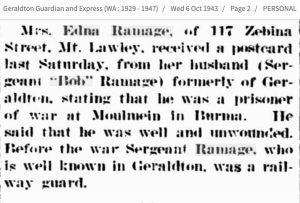
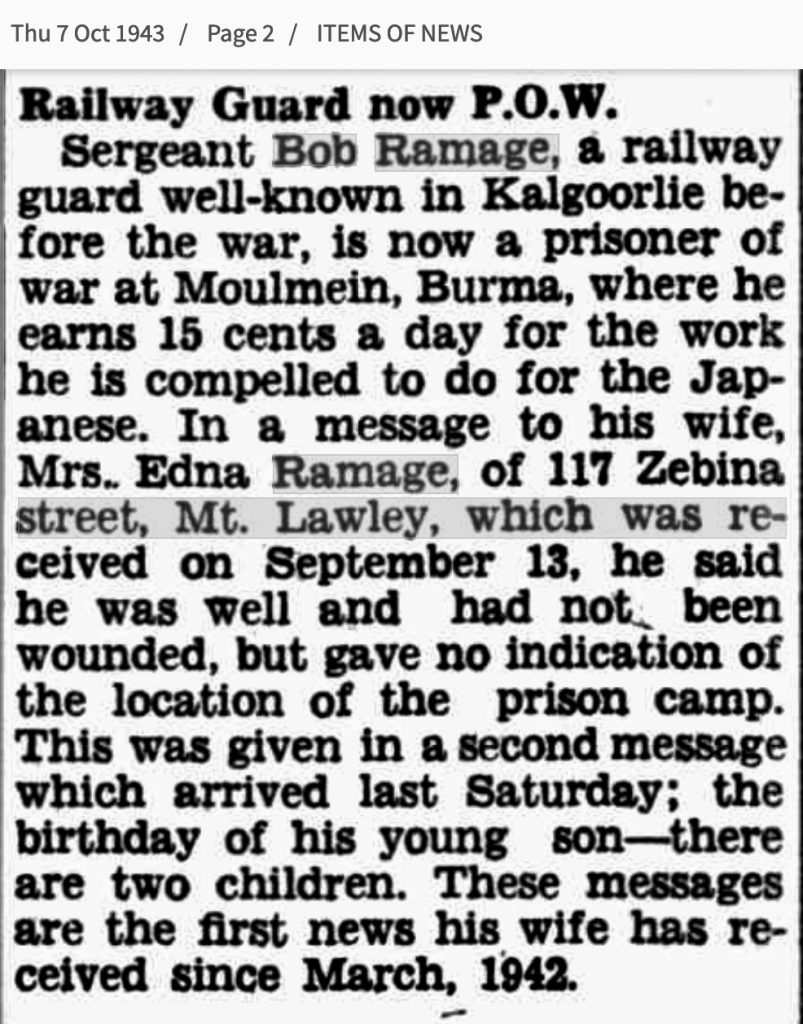
Sigs
L-R Claude Gault, Jack Wren, George Gossage (KIA) Harold Eastwood (KIA) Bob Ramage (d. illness Burma) (They were all in HQ No. 1 Platoon, Signals – except Jack Wren – who did not continue with 2/4th)
Bob (b. George Robert) b. 1905 to parents George Ramage and Helen (known as Ellen) Jones. Bob had at least one brother Stanley Cockburn Tate Ramage b. 1907 Bunbury and at least one sister Dorothy. When Bob’s father died in 1931 his parents were residing Geraldton. Bob’s mother Ellen died 1936 in Geraldton.
Bob Ramage married 1929 to Edna Florence Smith. They had two children Ken and Laurel. Their son Ken was born in Geraldton.
Below: Maida Smith who died 1934 is married to Edna’s brother.

Bob Ramage was born 1905 in the Augusta-Margaret River Shire to parents George Ramage and Ellen Jones who had married in South Australia, 1895 at Mile End. Bob was one of four children. Bob’s father George died 1931 and his mother 1936 in Geraldton.
Below: Bob’s father died Geraldton 1931.
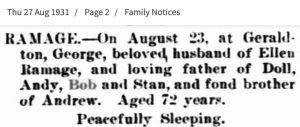
Below: Bob’s mother’s name is recorded on a 1934 document after the death of her husband. They had owned and operated a store at Geraldton.

Below: death of Bob’s mother Ellen Ramage.
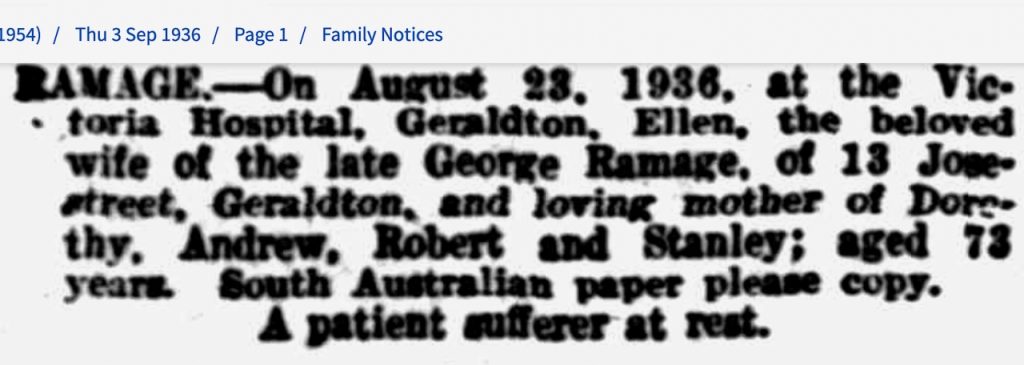
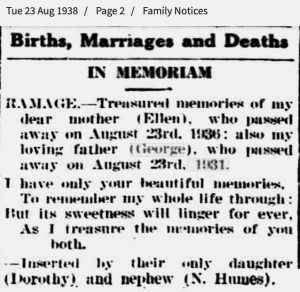
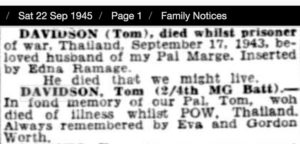
Above: Edna Ramage places a death notice for Tom Davidson.
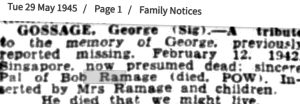
Above: George Gossage was close mate of Bob. They were in No. 1 Platoon. Kalgoorlie born Gossage was KIA 12 February 1942 aged 26 years.

Below: Ramage died of dysenetery at Payathonzu POW Camp 23 Sept 1943 aged 38 years. His body was moved to Thanbyuzayet War Cemetery in Myanmar, (formerly Burma).
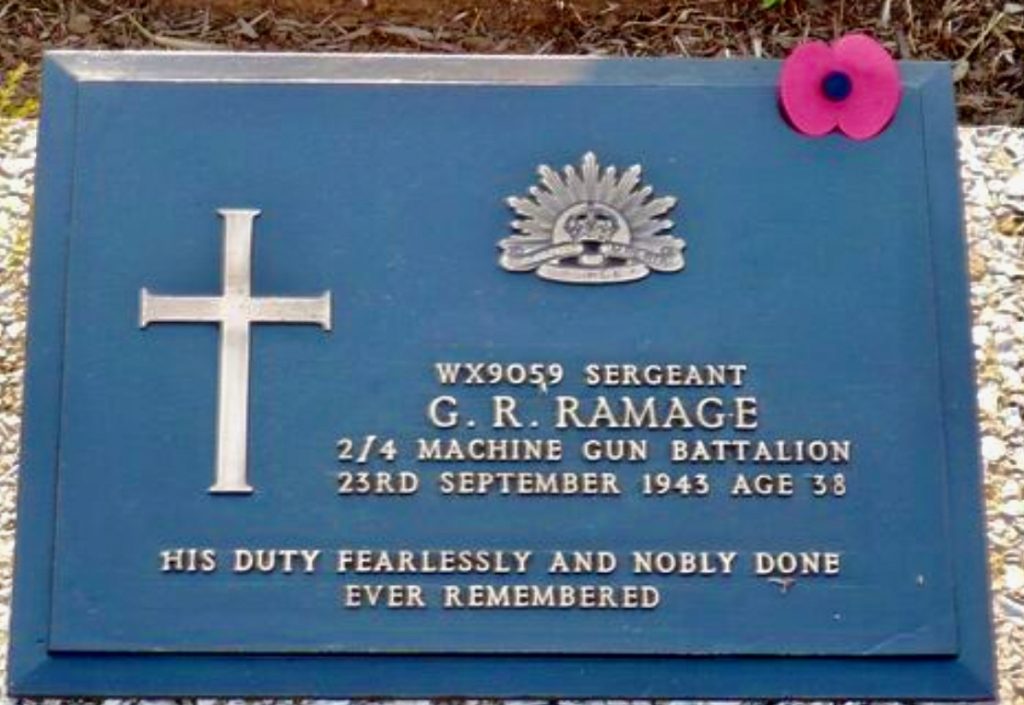
r

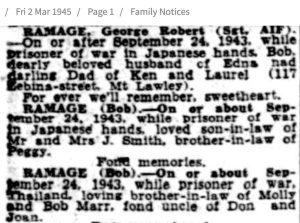
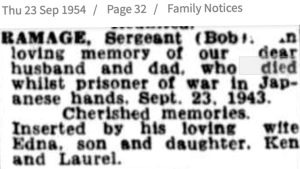
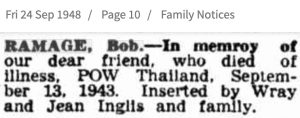

Above: From Edna’s brother.
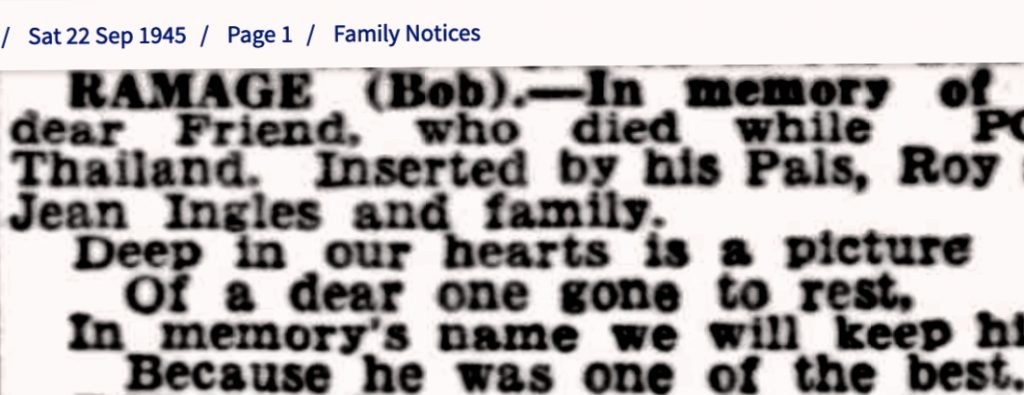
Many Hearts, One Voice – The story of the War Widows’ Guild in Western Australia – by Melinda Tognini printed by Fremantle Press)
The following was from above book:
Edna Ramage awaited news of her husband, Acting Sergeant George Robert Ramage, more commonly known as Bob. He had been sent with 2/4th Machine Gunners to join the 8th Division in Singapore. ‘We intend to hold Singapore,’ British general Arthur Percival declared on 9 February 1942.
Less than a week later, on 15 February, Singapore fell to the Japanese. Then, as Edna endured the uncertainty, the war arrived on the Australian mainland. On 19 February, Japanese planes bombed Darwin. John Curtin told the Australian public he had ‘been advised by the Department of the Air that a number of bombs were dropped this morning.’ The full extent of the damage and the number of casualties were not made public for some time, the West Australian reporting that the bombs had a ‘limited range in the death and destruction which they wrought.’
The Japanese attacked Broome less than a fortnight later on 3 March, leaving about seventy people dead, then Townsville, Katherine, Derby, Wyndham, Onslow and Port Hedland.14 The war was too close for Edna Ramage. What if the Japanese moved further down the coast? What then?
Edna contacted her sister, who lived in the gold mining town of Kalgoorlie, 550 kilometres east of Perth. The children would be safer there. Her daughter Laurel, aged ten, complied and travelled to Kalgoorlie to stay with her aunt, but twelve year old Ken refused to go; he remained in Perth to finish school and keep an eye on his mother.
Edna eventually received news that Bob was a prisoner of war in Singapore, and later found out that he had been sent to work on the Burma Railway. Her anxieties were relieved only momentarily by occasional, heavily censored prisoner-of-war cards. She occupied herself by working in a tent-making factory; this helped her feel she was contributing to the war effort, and provided camaraderie during her husband’s absence.
For Edna Ramage and her children, VP Day was filled with sadness after hearing that her husband and their father would not be returning home. Whenever Edna’s brother had heard of a train or ship arriving, he went to meet it, asking for any news of Bob Ramage. Eventually, he had come across a man who had been in the same prisoner-of-war camp and recalled a September night in 1944 when fellow prisoners brought Bob into the camp after a long day on the Burma Railway. Suffering from dysentery, he died soon afterwards. Edna had received a card from Bob that same month.
Tognini then discussed the following:
A widow’s grief was exacerbated by the fact that the allotment given to her from her husband’s pay was cancelled upon his death. The basic pension of £2.10 per week paid to the wives of men killed on active duty was less than half the basic wage, although even this was more than twice the pittance offered to widows of civilians. Furthermore, there existed in the Repatriation Act a morality clause which could see a war widow’s pension cancelled altogether if authorities deemed her ‘immoral’.
A war widow with children needed to be both breadwinner and nurturer.
We have to ask ourselves, how did widows manage? Their grief was immense, then on top of which they now faced the huge question and future of how she and her family would survive. There would not have been work available in rural areas.
For this reason alone, widows frequently remarried, sometimes to returned soldiers. Thereafter she and her children rode the roller-coaster of blended families and step-parents. I have heard stories where children were never allowed to mention their father who had died. All photos were removed and the father’s name never mentioned again.
Below: Bob’s brother Andrew died 1952 Melbourne.
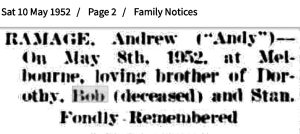
Below: Bob’s employment records with WAGR.
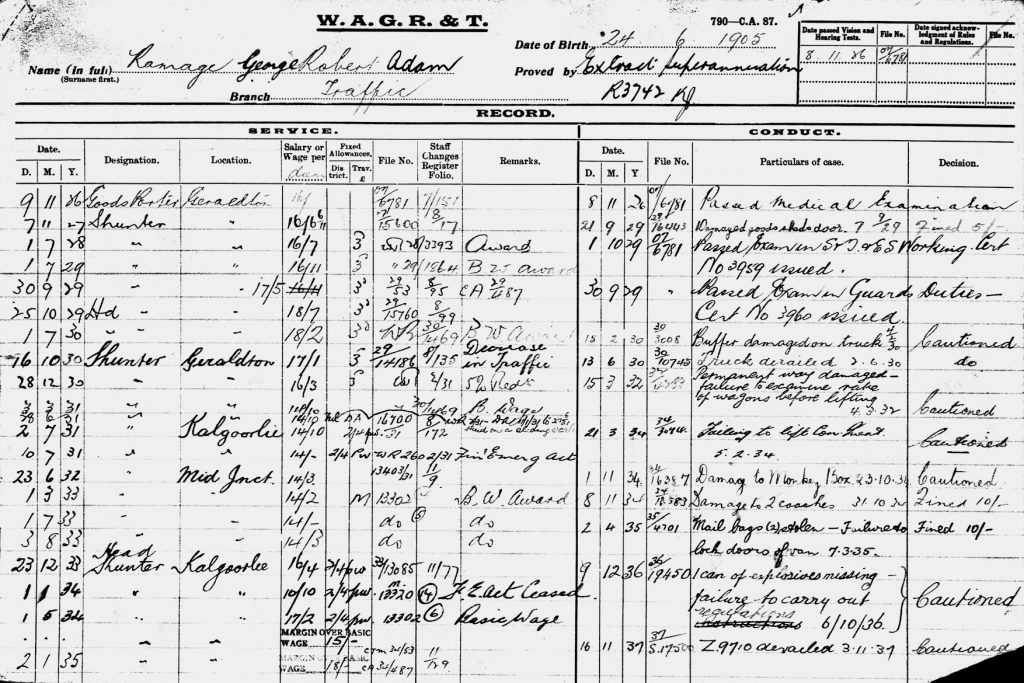
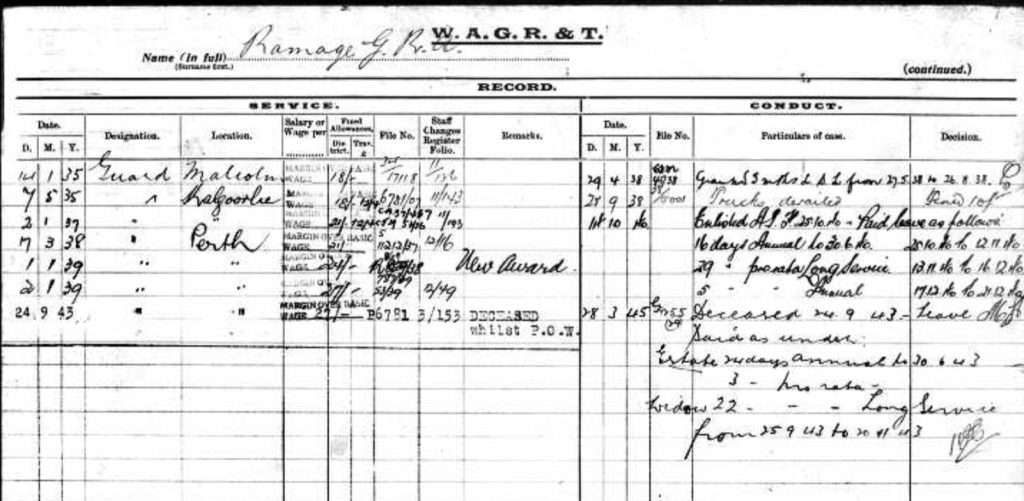
Camp Locations:
- Apalon, Apalaine, 80 Kilo, 337k - Burma
- Taungzun, 60 Kilo, 358k - Burma
- Bicycle Camp, Batavia, Jakarta - Java ***
- Tanyin 35 Kilo Camp - Burma
- Anakwin 45 Kilo Camp - Burma
- Mezali 70km Camp - Burma
- Kyondaw 95 Kilo Camp – Burma
- Payathonzu or Paya-thonzu Taung 108 Kilo Camp, Burma

